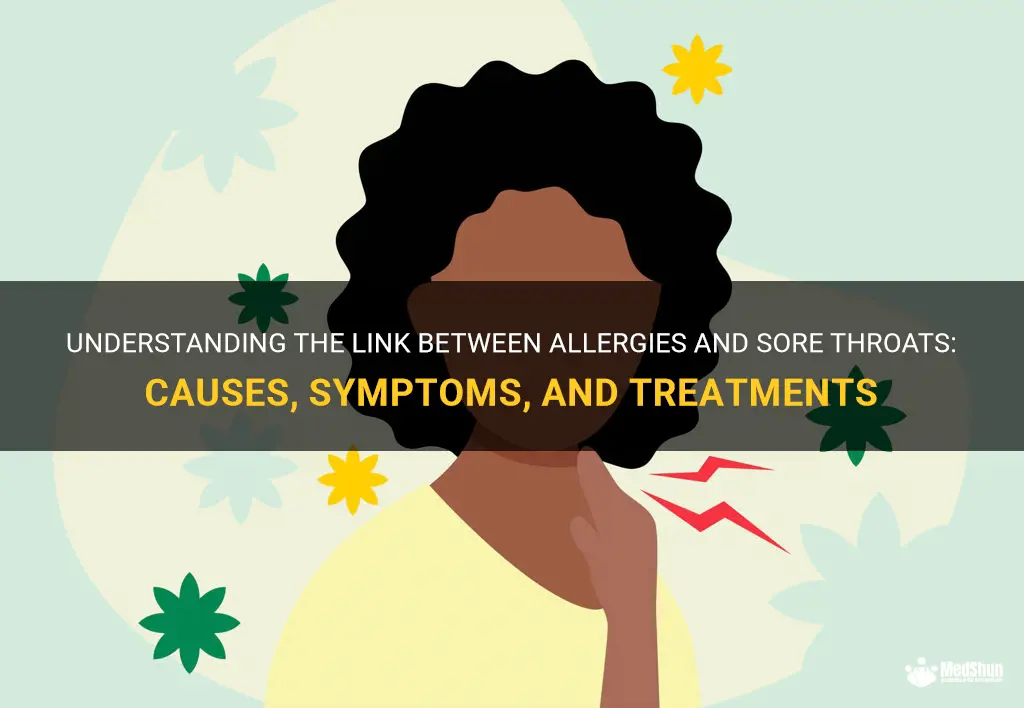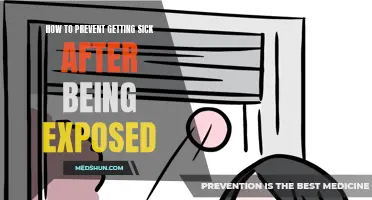
Sore throat is a common ailment that many people experience, often associated with cold or flu. However, in some cases, a sore throat can be caused by allergies. Allergies can trigger an allergic reaction in the throat, leading to inflammation and discomfort. This type of sore throat can be especially frustrating as it is not always easily managed or treated. In this article, we will explore the causes, symptoms, and potential treatments for a sore throat caused by allergies, offering insights into how to cope with this unique and often overlooked condition.
| Characteristic | Value |
|---|---|
| Main Symptom | Sore throat |
| Allergy Triggers | Pollen, dust mites, pet dander, mold spores |
| Other Symptoms | Sneezing, runny or stuffy nose, itchy eyes |
| Duration of Symptoms | Varied, usually last as long as the allergen exposure |
| Severity of Symptoms | Mild to moderate, rarely severe |
| Time of Year | Depends on specific allergen and region |
| Treatment Options | Antihistamines, nasal sprays, allergy shots |
| Prevention Strategies | Limit exposure to allergens, keep windows closed |
| Common Associated Conditions | Hay fever, asthma, sinusitis |
What You'll Learn
- What are the common symptoms of a sore throat due to allergies?
- How can I differentiate between a sore throat caused by allergies and one caused by a cold or flu?
- What are the most common allergens that can lead to a sore throat?
- Are there any specific treatments or remedies for a sore throat caused by allergies?
- How long does a sore throat caused by allergies typically last?

What are the common symptoms of a sore throat due to allergies?
A sore throat can be a common symptom of allergies. When the immune system reacts to an allergen, such as pollen, pet dander, or dust mites, it can cause inflammation and irritation in the throat. This can lead to discomfort, pain, and difficulty swallowing.
One of the main symptoms of a sore throat due to allergies is a persistent itchiness or tickling sensation in the throat. This sensation can be quite uncomfortable and may make it difficult to focus on other tasks. It is often accompanied by a constant urge to clear the throat or cough, which can further irritate the throat and make it sore.
Another common symptom is a hoarse or raspy voice. The inflammation and irritation caused by allergies can affect the vocal cords, leading to a change in the quality of the voice. This can make it difficult for individuals to speak clearly or project their voice.
In some cases, individuals may also experience swollen glands in the neck. The lymph nodes located in the neck can become enlarged as the immune system responds to the allergen. This can result in tenderness and discomfort, especially when swallowing.
Post-nasal drip is another symptom that can contribute to a sore throat. When allergens are inhaled, they can irritate the nasal passages and stimulate excessive mucus production. This excess mucus then drips down the back of the throat, irritating the throat and causing it to become sore.
Individuals experiencing a sore throat due to allergies may also have other associated symptoms, such as nasal congestion, sneezing, watery eyes, and fatigue. These symptoms are often a result of the allergic reaction and can contribute to the overall discomfort and irritation of the throat.
It is important to note that while allergies can cause a sore throat, other factors such as viral or bacterial infections can also result in similar symptoms. Therefore, it is recommended to consult with a healthcare professional for an accurate diagnosis and appropriate treatment.
In summary, a sore throat due to allergies can present with symptoms such as persistent itching or tickling sensation, hoarse or raspy voice, swollen glands, post-nasal drip, and other associated symptoms. Understanding these symptoms can help individuals identify the cause of their sore throat and seek appropriate treatment.
Exploring the Link: Can RSV Cause Chills?
You may want to see also

How can I differentiate between a sore throat caused by allergies and one caused by a cold or flu?
A sore throat can be a bothersome symptom, but it is important to determine its underlying cause in order to receive the appropriate treatment. Distinguishing between a sore throat caused by allergies and one caused by a cold or flu can be challenging, as there are similarities in the symptoms they produce. However, by examining certain factors, you can differentiate between the two.
Timing and Duration:
One key factor in determining the cause of a sore throat is the timing and duration of symptoms. If you notice that your sore throat occurs around the same time every year or is persistent and lasts for an extended period, allergies may be the culprit. On the other hand, if your sore throat appears suddenly and is accompanied by other cold or flu symptoms, it is more likely to be caused by a viral infection.
Additional Symptoms:
Allergies commonly manifest through symptoms such as itchy or watery eyes, sneezing, and a runny or stuffy nose. These symptoms are usually absent in cases of a sore throat caused by a cold or flu. In cases of a viral infection, you may experience symptoms such as cough, congestion, body aches, fatigue, and sometimes a fever. By assessing the presence of additional symptoms, you can gain insight into the likely cause of your sore throat.
Season and Exposure:
The time of year can also provide clues regarding the cause of a sore throat. If your sore throat tends to occur during specific seasons, particularly during times when certain allergens, such as pollen, are prevalent, it is more suggestive of allergies. Exposure to known allergens, such as pets, mold, or dust, can also play a role in determining the cause.
Response to Treatment:
Treatment responses can help differentiate between a sore throat caused by allergies versus one caused by a viral infection. If antihistamines or nasal sprays provide relief from your symptoms, it is more likely that allergies are to blame. Conversely, if over-the-counter cold or flu medications, such as pain relievers or decongestants, alleviate your sore throat, it is more indicative of a viral infection.
To illustrate these factors, let's consider two scenarios:
Scenario 1: Sarah experiences a sore throat every spring when pollen counts are high. She also suffers from itchy eyes and a runny nose during this time. Sarah's symptoms persist for several weeks but eventually improve after using over-the-counter antihistamines and avoiding exposure to pollen. Based on the timing, duration, and response to treatment, Sarah's sore throat is likely caused by allergies.
Scenario 2: John wakes up with a sudden sore throat, cough, and congestion. He feels fatigued and has a low-grade fever. John's symptoms worsen over the next few days before gradually improving after a week of rest, fluids, and over-the-counter cough suppressants. Given the sudden onset, additional symptoms, and response to treatment, John's sore throat is more likely due to a viral infection.
By carefully considering the timing, duration, additional symptoms, exposure, and response to treatment, you can differentiate between a sore throat caused by allergies and one caused by a cold or flu. It is important to consult with a healthcare professional if you are unsure or if your symptoms worsen or persist. They will be able to provide an accurate diagnosis and recommend the most effective treatment.
Exploring the Ingredients of Nyquil Cold and Flu: What You Need to Know
You may want to see also

What are the most common allergens that can lead to a sore throat?
A sore throat can be caused by various factors, including allergens. Allergens are substances that trigger an allergic reaction in some individuals. These reactions can lead to inflammation in the throat and result in a sore throat. In this article, we will explore the most common allergens that can lead to a sore throat.
- Pollen: Pollen is a common allergen, particularly during the spring and fall seasons. When people with allergies are exposed to pollen, their immune system reacts, causing the release of histamines. Histamines can lead to inflammation, itching, and a sore throat.
- Dust mites: Dust mites are tiny creatures that live in household dust. They can be found in bedding, carpeting, and upholstery. When individuals with dust mite allergies inhale or come into contact with dust mite particles, they can experience allergy symptoms, including a sore throat.
- Mold: Mold spores, which thrive in damp and humid environments, can trigger allergic reactions in susceptible individuals. When mold spores are inhaled, they can irritate the throat and cause inflammation, leading to a sore throat.
- Pet dander: Pets, such as dogs and cats, produce dander, which is a common allergen. When individuals with pet allergies are exposed to pet dander, they may develop allergy symptoms, including a sore throat. This can occur even in individuals who do not have direct contact with the animal, as pet dander can be easily spread through the air.
- Certain foods: Some individuals may experience allergic reactions to certain foods, such as nuts, shellfish, or dairy products. These allergic reactions can manifest as a sore throat, along with other symptoms such as hives, digestive issues, or difficulty breathing.
- Environmental irritants: Certain environmental irritants, such as cigarette smoke, can also trigger allergic reactions in sensitive individuals. When exposed to cigarette smoke or other irritants, individuals may develop a sore throat as a result of the irritation caused by the allergen.
If you suspect that your sore throat is caused by allergens, it is important to consult with a healthcare professional to determine the specific allergen and develop an appropriate treatment plan. They may recommend over-the-counter antihistamines, nasal sprays, or allergy shots to manage your symptoms.
In conclusion, a sore throat can be caused by various allergens, including pollen, dust mites, mold, pet dander, certain foods, and environmental irritants. Identifying the specific allergen and seeking proper treatment can help alleviate symptoms and prevent future allergic reactions.
Do Allergies Cause Chills? Exploring the Connection Between Allergic Reactions and Chill Symptoms
You may want to see also

Are there any specific treatments or remedies for a sore throat caused by allergies?
A sore throat can be a common symptom of allergies, particularly if you are prone to allergic rhinitis or hay fever. When allergens such as pollen, dust mites, or pet dander irritate the throat, it can lead to inflammation and discomfort. Fortunately, there are several treatments and remedies that can help alleviate a sore throat caused by allergies.
- Identify and avoid allergens: The first step in managing a sore throat caused by allergies is to identify the specific allergen triggering your symptoms. Allergy testing can help pinpoint the allergens causing your throat irritation. Once identified, take steps to reduce your exposure to these allergens. For example, if pollen is the culprit, try to stay indoors during peak pollen times and keep windows closed. If dust mites are the problem, use allergen-proof covers for your bedding and wash sheets in hot water regularly.
- Nasal irrigation: Nasal irrigation can help relieve allergy symptoms that contribute to a sore throat. Using a saline solution, you can flush out allergens, mucus, and irritants from your nasal passages. This can reduce postnasal drip, which can contribute to throat irritation. You can use a nasal saline rinse or a neti pot to perform nasal irrigation.
- Over-the-counter antihistamines: Antihistamines can be helpful in reducing allergy symptoms, including sore throat. These medications work by blocking the effects of histamine, a chemical released during an allergic reaction. Antihistamines come in different forms such as tablets, capsules, or nasal sprays. It is important to follow the recommended dosage and consult with a healthcare professional before taking any medication.
- Sore throat lozenges or sprays: Sore throat lozenges or sprays can provide temporary relief by numbing the throat and reducing discomfort. Look for products containing ingredients like benzocaine or menthol, which have a soothing effect. It is important to note that these remedies only provide temporary relief and should not be used as a long-term solution.
- Warm saltwater gargles: Gargling with warm saltwater can help soothe a sore throat caused by allergies. Saltwater can help reduce inflammation and kill bacteria in the throat. Mix half a teaspoon of salt in a glass of warm water and gargle the mixture for 30 seconds before spitting it out. Repeat this several times a day for relief.
- Stay hydrated: Drinking plenty of fluids can help keep your throat moist and soothe irritation. Opt for warm beverages like herbal tea or warm water with lemon and honey. Avoid caffeinated or alcoholic drinks, as they can contribute to dehydration.
- Allergy shots or immunotherapy: If your allergies are persistent and causing severe symptoms, your healthcare provider may recommend allergy shots or immunotherapy. These treatments involve gradually exposing you to small amounts of allergens to desensitize your immune system. Over time, this can reduce your sensitivity to allergens and alleviate allergic symptoms, including a sore throat.
It is important to note that these treatments and remedies may provide relief for a sore throat caused by allergies, but they may not address the underlying allergy itself. It is advisable to consult with a healthcare professional for a proper diagnosis and personalized treatment plan. They can help identify the best course of action based on the severity of your symptoms and your specific allergies.
Is Excessive Sneezing a Sign of COVID?
You may want to see also

How long does a sore throat caused by allergies typically last?
A sore throat caused by allergies can be quite bothersome and can impact your daily activities. Knowing how long it typically lasts can help you manage your symptoms and provide relief. In this article, we will explore how long a sore throat caused by allergies usually lasts and what you can do to alleviate the discomfort.
Allergies occur when your body's immune system reacts to a substance, such as pollen, dust, or pet dander, triggering an allergic response. This response can cause inflammation and irritation in various parts of the body, including the throat. When allergens come into contact with the delicate tissues in your throat, they can cause a range of symptoms, including a sore and scratchy throat.
The duration of a sore throat caused by allergies can vary from person to person. In general, most people with allergies experience a sore throat for a few days to a week. However, in some cases, the symptoms may persist for a longer duration, depending on the individual's sensitivity to allergens and the severity of the allergic reaction.
It's important to note that if you are experiencing a sore throat for an extended period or if your symptoms worsen, it may be wise to consult a healthcare professional. They can evaluate your condition and recommend appropriate treatment options.
Managing a sore throat caused by allergies involves both preventive measures and symptom relief. Here are a few steps you can take to alleviate discomfort and speed up the healing process:
- Identify and avoid allergens: Determine the specific allergens that trigger your symptoms and take necessary steps to minimize your exposure to them. For example, if pollen is your trigger, try to stay indoors during peak pollen times or use air purifiers in your home.
- Stay hydrated: Drinking plenty of fluids can help soothe your sore throat. Warm liquids, such as tea with honey or warm water with lemon, can provide extra relief.
- Gargle with saltwater: Mixing half a teaspoon of salt in a glass of warm water and gargling with it can help reduce inflammation and alleviate discomfort in your throat.
- Use a humidifier: Adding moisture to the air can help soothe a dry and irritated throat. Use a humidifier in your bedroom or take a steamy shower to increase humidity.
- Over-the-counter remedies: Over-the-counter antihistamines, decongestants, and throat lozenges may provide temporary relief from allergy symptoms. However, it is always best to consult with a pharmacist or healthcare professional to choose the right product for you and to ensure proper usage.
- Allergy medications: If your symptoms are severe or persistent, your healthcare professional may recommend prescription allergy medications, such as nasal sprays or oral tablets, to manage your symptoms effectively.
Remember, everyone's experience with allergies is different, so the duration of a sore throat caused by allergies can vary. By taking preventive measures, staying hydrated, and seeking appropriate treatment, you can minimize the impact of allergies on your throat and overall well-being. If your symptoms persist or worsen, consult a healthcare professional for further evaluation and guidance.
Can Lemon Help Alleviate Flu Symptoms?
You may want to see also
Frequently asked questions
Yes, a sore throat can be caused by allergies. Allergies can trigger an immune response in the body, leading to inflammation and irritation in the throat. This can result in a scratchy or sore feeling in the throat. Common allergens that can cause a sore throat include pollen, pet dander, dust mites, and mold.
While many of the symptoms of a sore throat caused by allergies and a sore throat caused by a cold or flu may be similar, there are some key differences to look out for. Allergy-related sore throats are often accompanied by other allergy symptoms, such as sneezing, itchy and watery eyes, and a runny nose. On the other hand, sore throats caused by a cold or flu are typically accompanied by symptoms like coughing, fever, body aches, and fatigue. If you're unsure, it's best to consult with a healthcare professional for an accurate diagnosis.
There are several ways to manage a sore throat caused by allergies. Firstly, it's important to identify and avoid the allergen that is triggering your symptoms. This may involve keeping windows closed, using air purifiers, and minimizing exposure to pollen or other allergens. Over-the-counter antihistamines and nasal sprays can also help reduce throat inflammation and relieve allergy symptoms. Gargling with warm saltwater or using throat lozenges can provide temporary relief as well.
In most cases, a sore throat caused by allergies will resolve on its own with proper management and avoidance of allergens. However, it's important to seek medical attention if your symptoms are severe, persist for more than a few days, or are accompanied by difficulty breathing, a high fever, or swollen glands. These symptoms may indicate a more serious condition that requires medical intervention. It's always best to consult with a healthcare professional if you have any concerns or questions about your symptoms.







